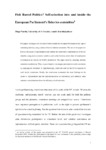Mostrar o rexistro simple do ítem
Fish Barrel Politics? Self-selection into and inside the European Parliament's fisheries committee
| dc.contributor.author | Varela Pedreira, Diego | |
| dc.date.accessioned | 2009-10-22T08:43:35Z | |
| dc.date.available | 2009-10-22T08:43:35Z | |
| dc.date.issued | 2009-10-22T08:43:35Z | |
| dc.identifier.uri | http://hdl.handle.net/2183/2747 | |
| dc.description | An earlier version of this paper was presented at the 31st UACES annual conference in Bristol, September 2001. I thank the participants in the panel for their comments. | es_ES |
| dc.description.abstract | This paper investigates the division of labour inside the European Parliament in the light of contending theories, using evidence from its fisheries committee. The aim of the paper is to find out the causes of specialisation and whether the committee is representative of the full chamber, using socio-economic variables such as the fisheries sector share of employment or production as proxies for MEPs’ preferences. The paper starts by analysing nominal committee membership. Then, it goes deeper to investigate participation inside committee, by analysing the allocation of rapporteurships, which are used by the EP to organise its work inside committees. Finally, the conclusions summarise the main findings on the causes of specialisation and the representativeness of committees, and introduce some normative considerations about the efficiency of self-selection. | es_ES |
| dc.language.iso | eng | es_ES |
| dc.subject | European Parliament | es_ES |
| dc.subject | Committee | es_ES |
| dc.subject | Specialization | es_ES |
| dc.subject | Rapporteur | es_ES |
| dc.title | Fish Barrel Politics? Self-selection into and inside the European Parliament's fisheries committee | es_ES |
| dc.type | info:eu-repo/semantics/workingPaper | es_ES |
| dc.rights.access | info:eu-repo/semantics/openAccess | es_ES |






